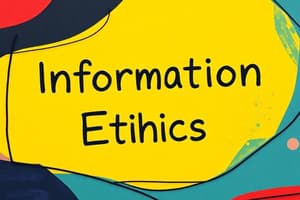Podcast
Questions and Answers
What is the term used for information that is intentionally misleading to promote a particular agenda?
What is the term used for information that is intentionally misleading to promote a particular agenda?
- Defamation
- Hoax
- Media literacy
- Propaganda (correct)
A hoax is an instance of legitimate news reporting.
A hoax is an instance of legitimate news reporting.
False (B)
What does 'defamation' refer to in legal terms?
What does 'defamation' refer to in legal terms?
False statements that harm someone's reputation.
Someone who is easily influenced by misinformation is described as being ______ to deception.
Someone who is easily influenced by misinformation is described as being ______ to deception.
Match the following terms with their definitions:
Match the following terms with their definitions:
Flashcards are hidden until you start studying
Study Notes
Definitions of Terms
-
Propaganda: Information, especially biased or misleading, used to promote a particular political cause or point of view; often disseminated by governments or organizations.
-
Media Literacy: The ability to access, analyze, evaluate, and create media in various forms; essential for understanding the influence of media on beliefs and behaviors.
-
Illegitimate: Not authorized by law or rules; lacking in legitimacy or validity; often refers to actions seen as improper or dishonorable.
-
Avalanche of News: An overwhelming amount of news information presented, which can create confusion or fatigue among the audience; refers to the constant influx in the digital age.
-
A Hoax: A deceptive act or trick that is intended to mislead or defraud; often involves a fabricated story or situation.
-
To Peddle a Conspiracy Theory: To promote or spread unfounded, secretive theories that suggest hidden agendas, usually against public knowledge; often involves sensationalism.
-
Defamation: The action of damaging the good reputation of someone through false statements; can be civil or criminal depending on jurisdiction.
-
Plausible: Something that is reasonable or probable; a claim that appears credible or believable based on available evidence.
-
To Dupe: To deceive or trick someone into believing something that is not true; often involves manipulation or clever tactics.
-
Corrupt: Willingly involved in dishonest or fraudulent behavior, often for personal gain; can describe individuals or systems that are morally impure.
-
Malevolent: Having or showing a wish to do evil to others; a personality trait associated with viciousness and harmful intentions.
-
Hypocrisy: The practice of claiming to have moral standards or beliefs to which one's own behavior does not conform; often leads to a contradiction between stated beliefs and actions.
-
To Renege on Something: To go back on a promise, commitment, or agreement; signifies a failure to uphold responsibilities or obligations.
-
Susceptible to Something: Vulnerable or open to being influenced or harmed by a particular factor; indicates a lack of resistance or immunity.
Studying That Suits You
Use AI to generate personalized quizzes and flashcards to suit your learning preferences.




